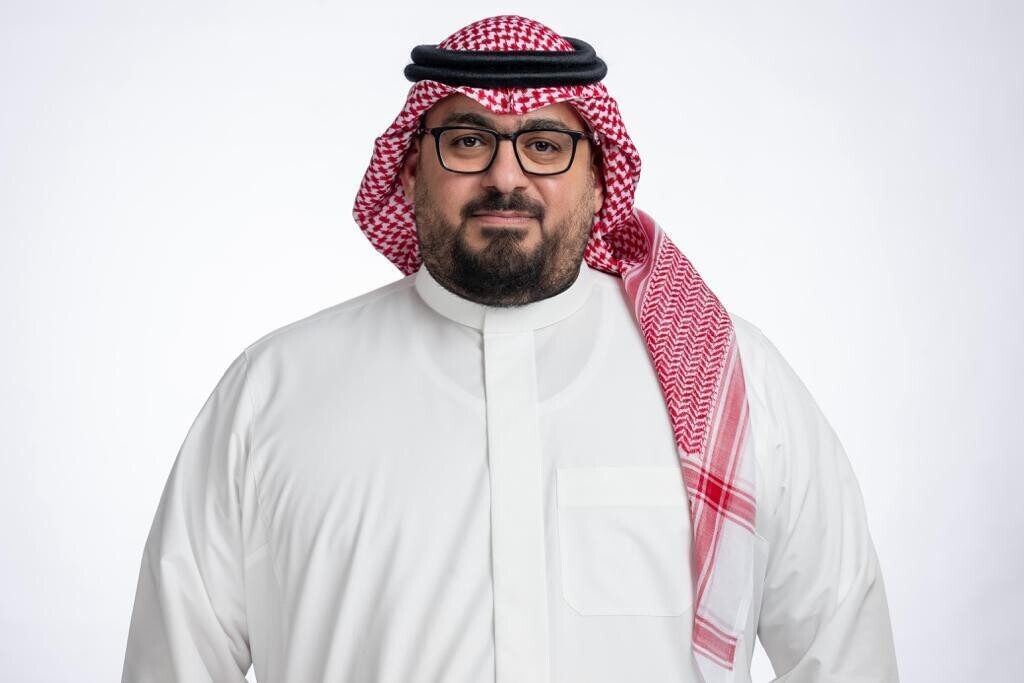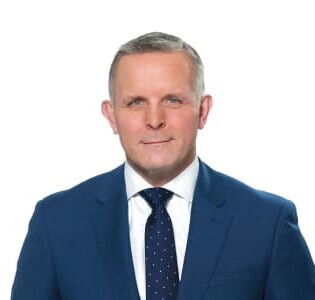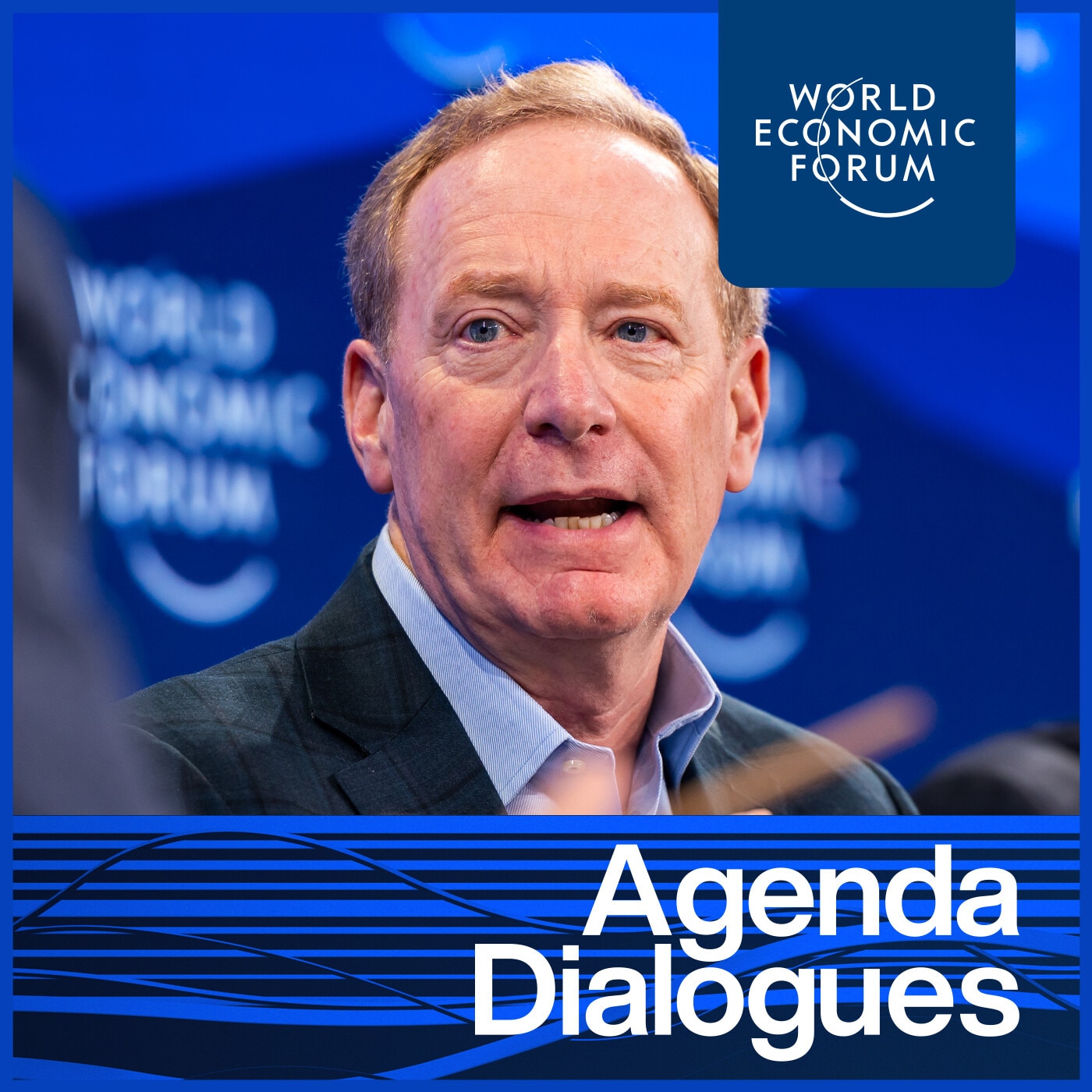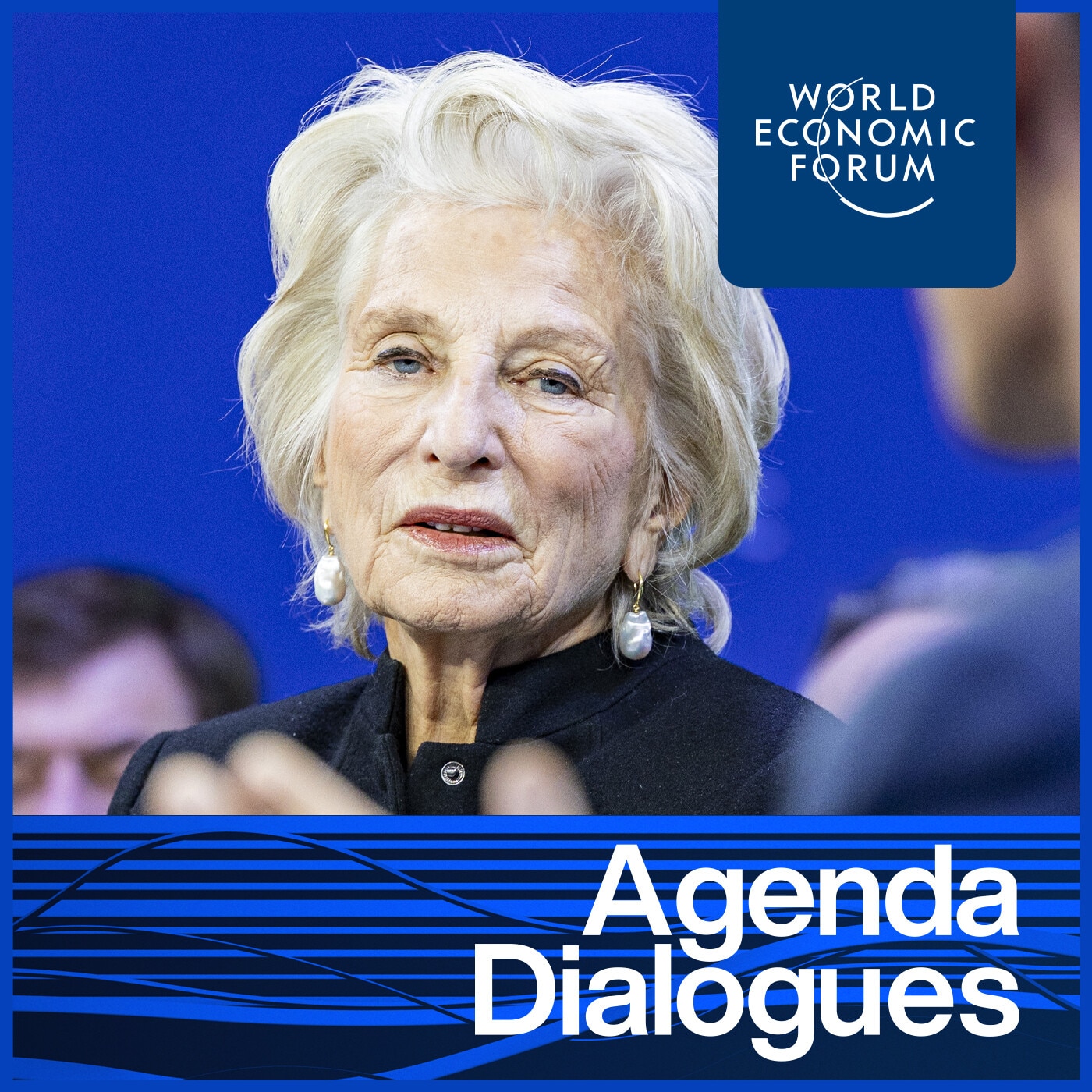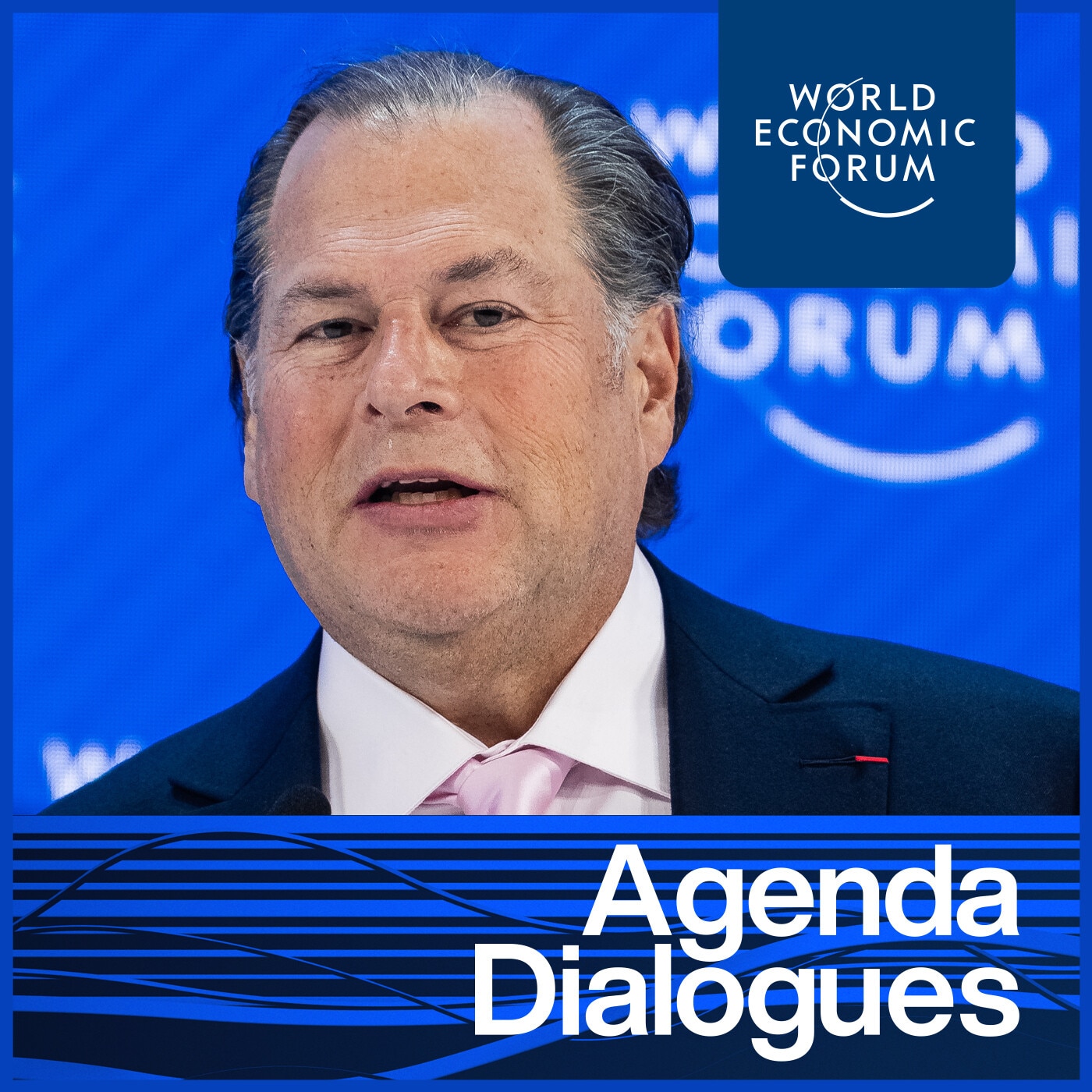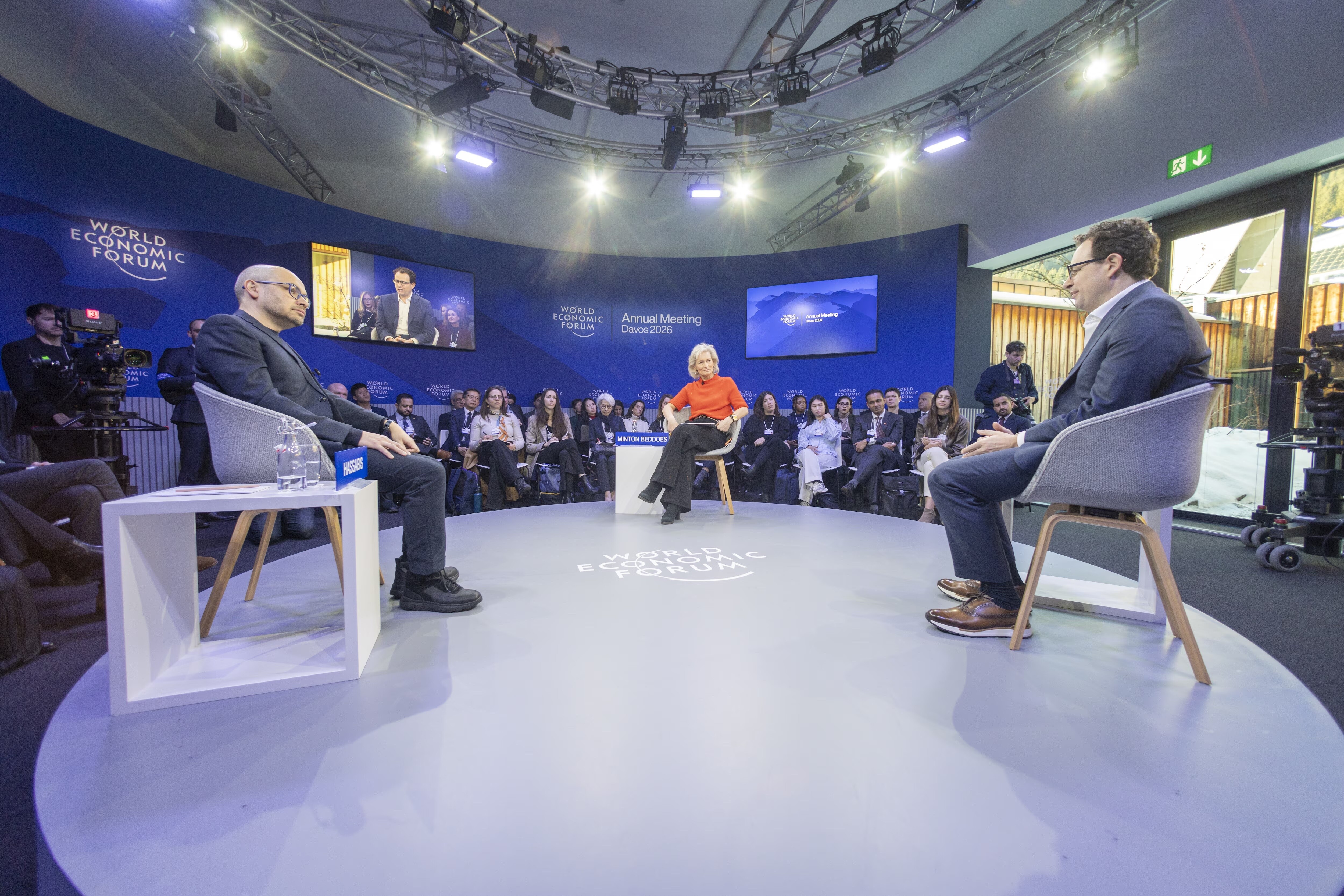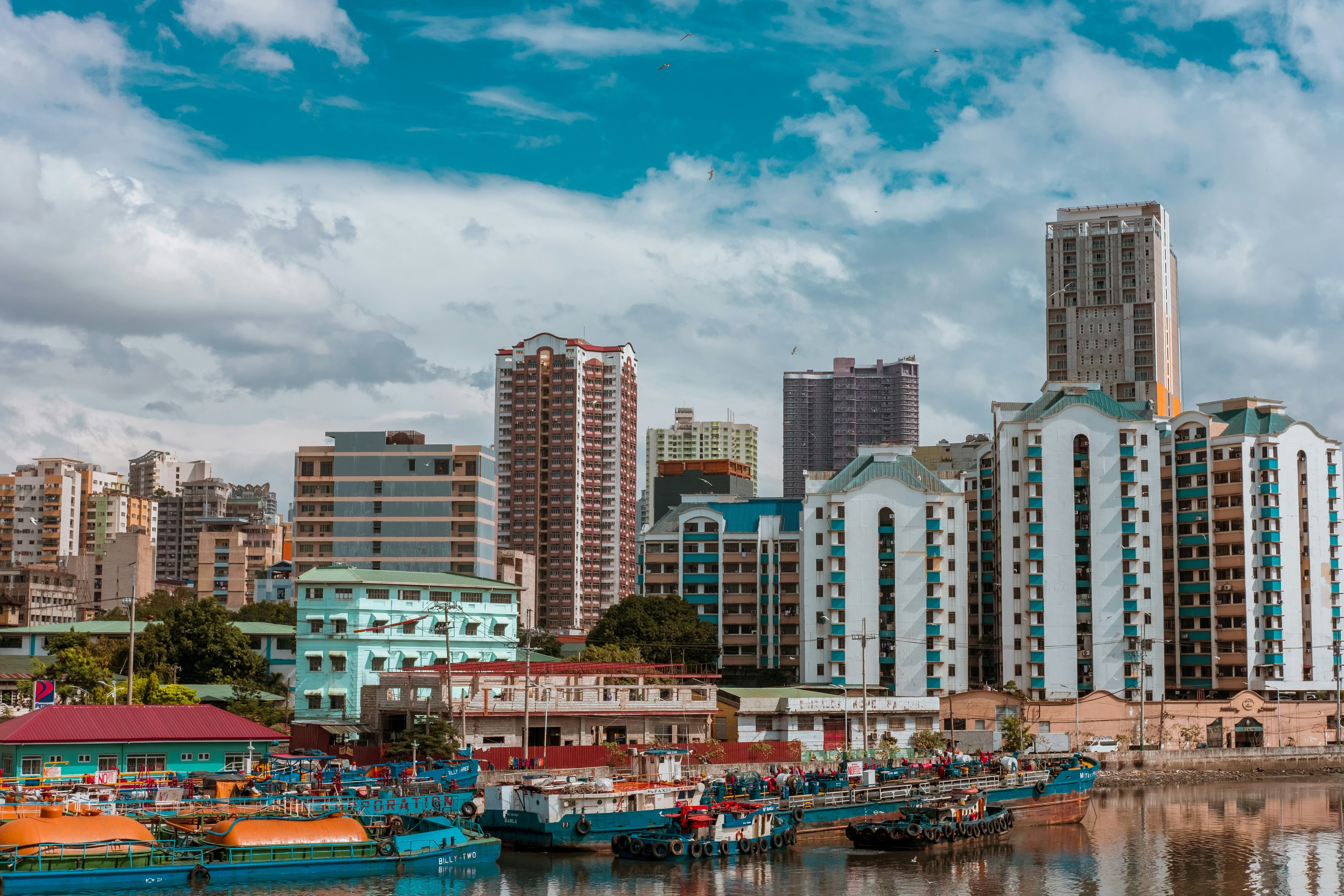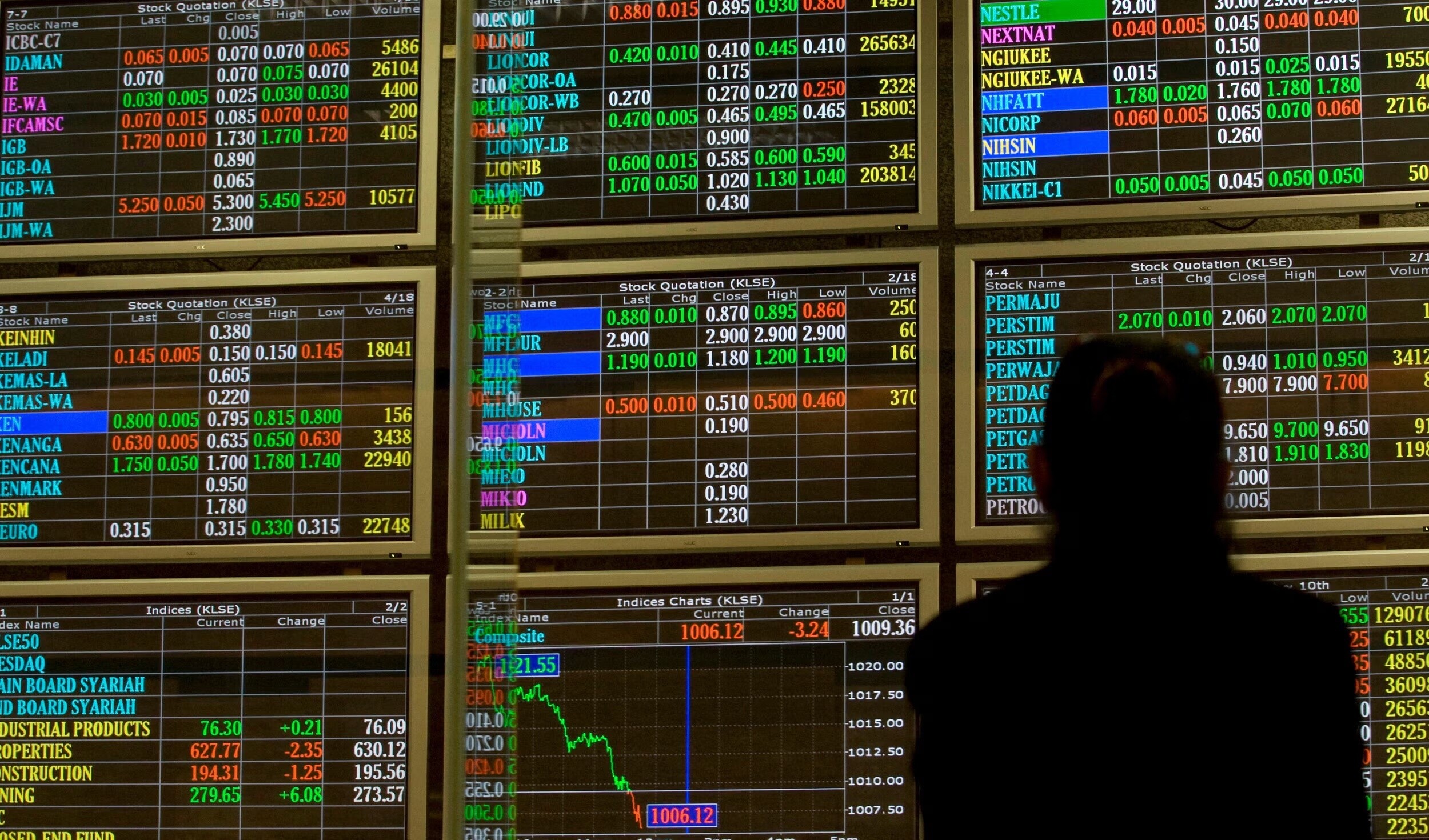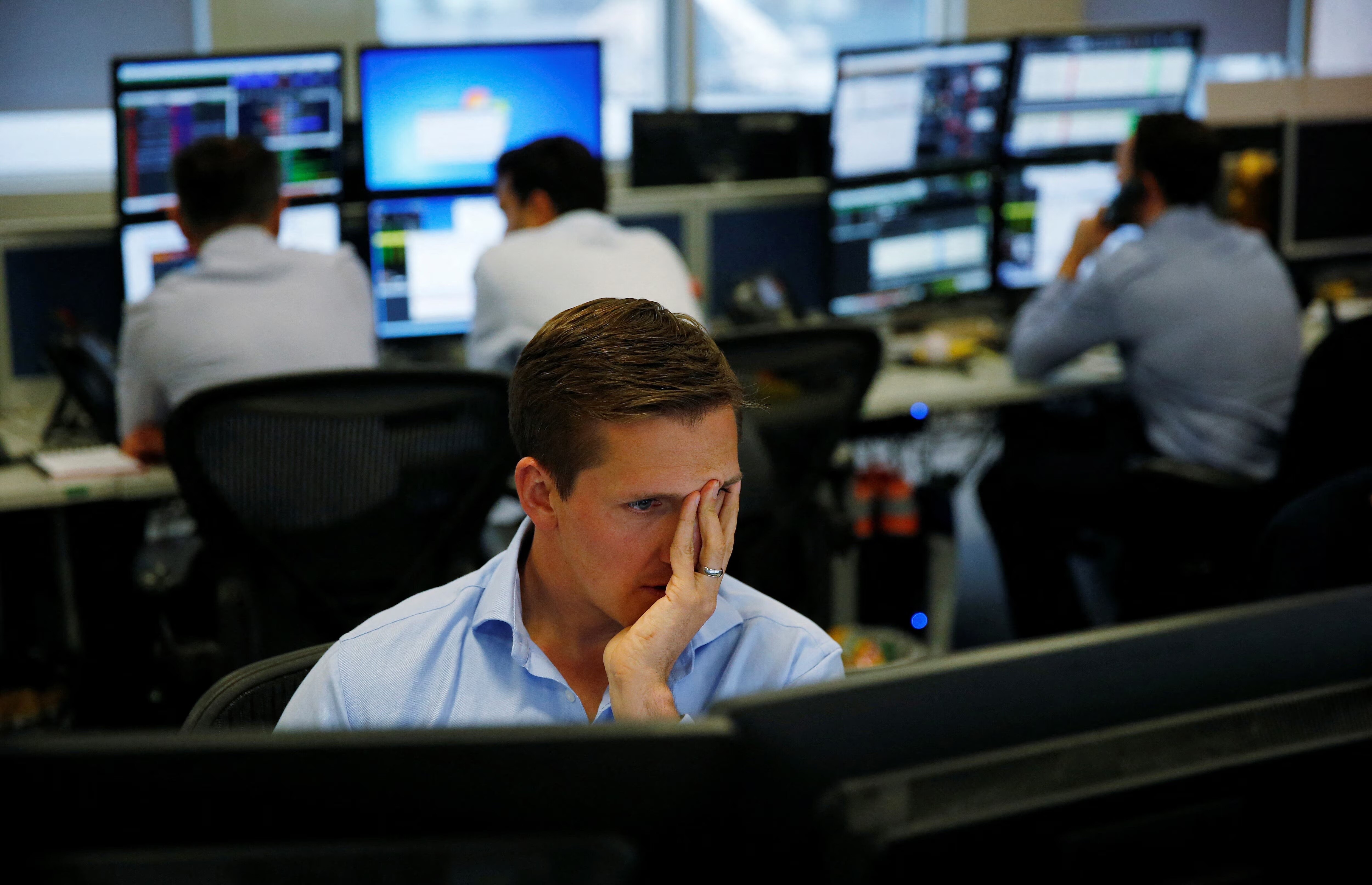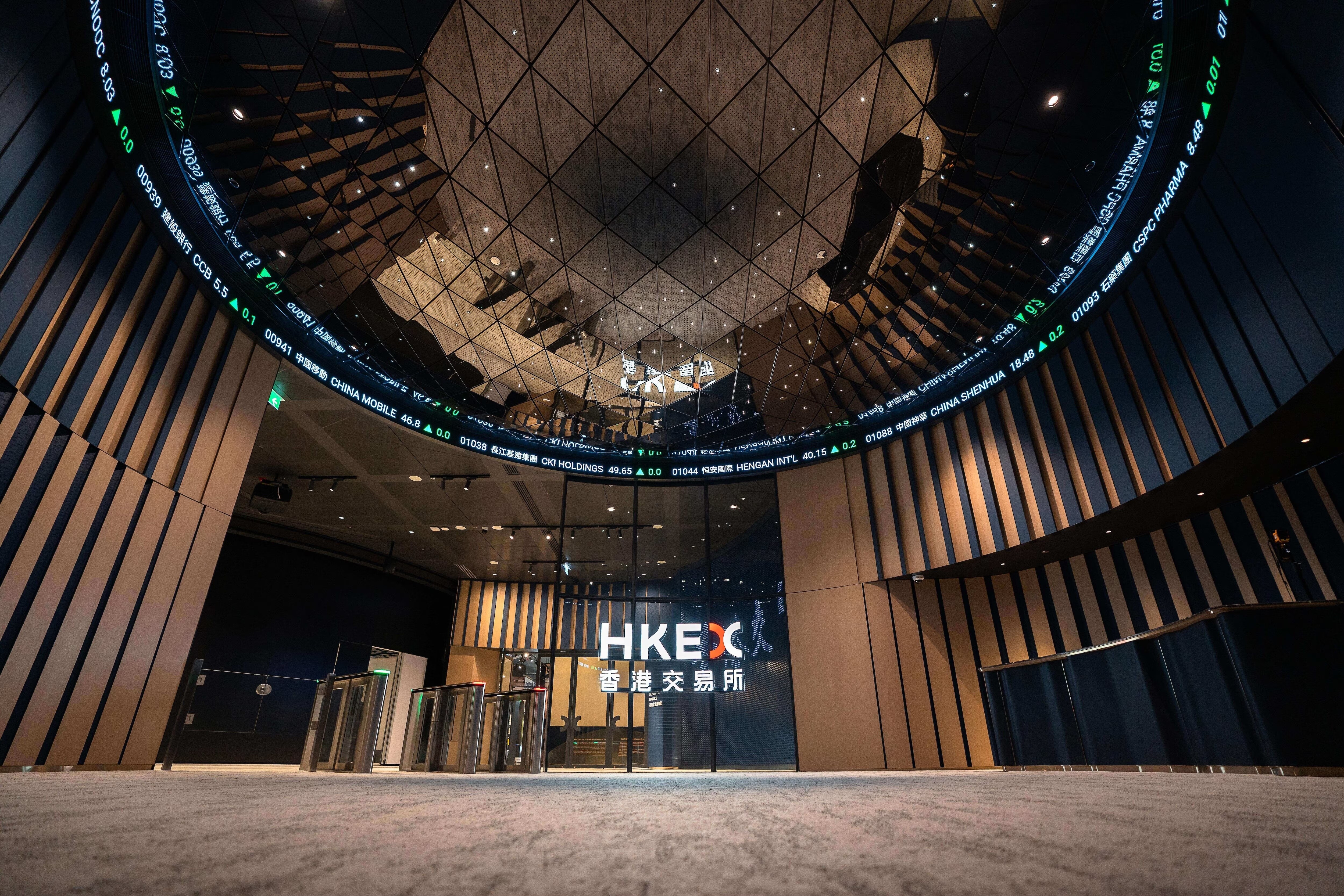Future of Growth
Transcripción del podcast
This transcript has been generated using speech recognition software and may contain errors. Please check its accuracy against the audio.
Steve Sedgwick, Anchor, CNBC
Ladies and gentlemen. Wow. Thank you so much indeed, for The World Economic Forum gave me this amazing opportunity to speak to these amazing people in this amazing location at what is, let's be brutally honest about it, the most stunning of times in the last 24 hours. The start of a seismic quake which could change the world. It just happened.
I'm determined not to make this entire panel about Donald Trump, but I'm torn. And I was awake half the night wondering, did they want Donald Trump? Do we just go for it on Trump or do we just actually put him in context the rest of the world? And I think that's where I'm going to go with this as well, because there are so many important things going on here in Europe, in the Middle East, in the United States, regardless of who the President is in Asia as well. And we've got so many concerns about whether China is going to make it to 4.6% this year, where they really made it to 5% last year as well. So there are growth drivers and growth challenges absolutely everywhere we look.
We have 45 minutes, 44 minutes to discuss this. I'm going to give you a lot of chance at the end to ask some questions as well. I ask you in advance, keep them brief and I'll get more questions through my panel. I've met all of them now, three of them previously, one of them I've just met, it's been a real honour to do so as well. And the best panels are where the moderator shuts up and the panellists really go for it amongst themselves. I will endeavour to do that. I talk for a living, as my boss knows, and so I will do my best to listen and try and guide the conversation rather than dictate the conversation as well.
Let me just tell you who the panellists are. His Excellency Faisal Alibrahim, the Minister of Economy and Planning for the Kingdom of Saudi Arabia. So it's lovely to meet you. Ana Botín, I've had the honour of meeting on many occasions. She is the incredibly robust and forthright Executive Chair of Santander, also Chair of the WEF International Business Council. Adena Friedman, we had the pleasure of meeting last year and we've met many times before, Chair and CEO of the Nasdaq. If growth is going to come from anywhere, it's going to come from innovation, it's going to come from technology. I think it's going to come from the private sector more than the public sector. We can discuss that as well. And Lawrence H. Summers, Larry Summers needs no introduction as well. Charles W Eliot University Professor, Harvard Kennedy School of Government, and of course, amongst many roles, former US Treasury Secretary. Good to see you, Larry, as well.
Let's just go down the line. We'll start very basically and open this conversation up – I'll start with His Excellency here as well – is growth. Where do you see where we're at? Where do you see the challenges? And obviously you'll put that in context, in the global context, in the context of where the Kingdom is at the moment.
Faisal Alibrahim, Minister of Economy and Planning, Ministry of Economy and Planning of Saudi Arabia
Sure. Thank you very much, Steve. It’s a great pleasure to be here. I think, you know, we need to acknowledge today growth is tepid, as Kristalina [Georgieva] mentioned or described it, the tepid 1920s that we're in when she was at the World Economic Forum event in April. Today between 3.2 and 3.3% – that's well below the historical average of 4%. It may seem like a little bit over a long period of time that is significant. And it begs the question, what do we do about this growth and what do we need to do to get out of this economic stalemate, especially if we look at more on the positive side, the disruptive capability or capacity of technologies that we can really utilize if we have better economic management, if we make the right decisions.
Take a step back. Rules and order – I think we're shifting from hyper-globalization to a new form of globalization, which maybe there is more fragmentation, but there's not necessarily less flow of people, goods, services, innovation, ideas. The sooner we know what that looks like, the more clear will be what the pathways for growth are going to be. And I think that's important. Maybe we need to be proactive, preempt, start working on these rules, what they look like, and try to build that future consistently and stubbornly and try to understand it before we have to react to it. Especially these days.
I'd add maybe a few more points. One, the importance of building the right institutional capabilities and investing in human capital. These are no regret things that are long term driven, that need to happen regardless of what you want to do, whether you want to utilize a lost opportunity or do you want to catch up. These two elements are extremely important, and if you want to leverage the power of technological disruption generative AI, it's even more important. The more institutionally capable you are, the more the people in your economy and society are ready and more active and more, I'd say, not considered idle capacity. The better you are in a position to leverage and not be left behind. It's important in generative AI, for example, to not just invest, not just to be part of the value chain, but to be a power user. And the more you're a power user, the better value you'll get from technology. But the more talent and innovative momentum you can attract to your economy and to your society. That's absolutely important.
One last point. I think the power of accumulating knowledge. We're working some universities to address how much knowledge we've accumulated in the Saudi economy and how we can leverage that to fire up new engines of growth or reinvigorate old sectors, which is part of our economic playbook under Vision 2030. There's a lot of power in accumulated knowledge and leveraging it. If you look at Saudi, just to quickly get to Saudi, Vision 2030 is an example of leveraging on all of these opportunities, but also trying to be a voice for shaping a more prosperous future. Because we've invested in our capabilities before, because we have today structured long term thinking and economic management that's serious about a long term restructuring of our economy so that we're more resilient and more ready for future growth.
Steve Sedgwick, Anchor, CNBC
Thank you, Minister. I will come back to Vision 2030 as well. I think you've actually been incredibly modest, if I may, talking about how a country with such vast mineral wealth and such a huge amount of extreme wealth from one source is actually saying, no, we are going to move, we are going to change, we're going to innovate, we have to diversify in an area of transition as well. I want to come back to Vision 2030 and really drill into a little bit more, if I may, in a few moments time.
Ana Botín, you have an extremely large global operation in Latin America, United States, Europe, elsewhere as well. You said to me beforehand, you said, I just want to focus and go really granular on growth itself. Why are we spending so much time talking about growth rather than other parameters as well? Why don't you just fill us in, why you feel the actual conversation about growth is absolutely pivotal for this meeting?
Ana Botín, Executive Chair, Banco Santander
Yes. Thank you, Steve. It's great to be here. Well, the bottom line is that growth is not an abstraction. It is literally an accelerating growth, actually, it's really at the base of our future prosperity and stability. And I've learned from Larry over the years that putting a few numbers helps. So if the difference between 3% and 5% growth means $3 trillion per year, that's $500 for each person on the planet. That's a huge amount of money that would allow us to pay down debt faster, would allow us to reduce inequality, would allow us to innovate more. So, again, this is not an abstraction. It's really the basis of prosperity and stability. So the second question, very briefly, and I'd make three points on how do we get this growth.
And so I think the first very important issue is the context. We are not in the same world as we were 20 years ago, and this is really important. You know, we have to your politics, you mentioned it fragmentation. We have to embed sustainability. We need to make sure that we address the AI consequences because, again, this could potentially be huge for the world but could aggravate the problems.
The second one is, you know, and I always like to sort of get to the answer by saying what is not the answer? And my strong belief is that the answer is not, and let me put this in context, too much industrial policy. The answer is in the private sector, it's the private sector that unleashes growth. And we don't have the financing. There's already too much debt. So it's up to the private sector. It's the private sector that's going to create the wealth that we can then redistribute. So we need to think about what ways, and this is government's role, to create the frameworks that allow the private sector to do our job properly.
Without going into much more. Let me just say two things. One is productivity. Obviously, that's the answer. And Draghi said it in his report, and we all know that. But there's another one which is really important, which is and I say let's take a pause on regulation and supervision, because that is constraining growth big time. So that would be in a nutshell. And obviously, each one of these points has a lot in itself. How I would think about the why it's important, big numbers, big impact and how we should address it in today's context, which I think is also crucial.
Steve Sedgwick, Anchor, CNBC
Ana we’ll come back to a lot of those points, especially about the role of government industrial policy, especially here in Europe. Because the thing I'm hearing already here in Davos, and I'll make no bones about it, is Europe. This is the time, it is not Trump we need to look at is actually we need to look at why we're not doing the same. What we haven't created a Doge, where the Doge comes up with billions or trillions of dollars worth of efficiency savings or not. It's Europe where we need to be looking at that, not necessarily the United States.
Adena Friedman, you represent an organization which is all about growth. It's all about fostering growth. It’s about taking those small companies and making them enormous. There are legions of famous American companies that have grown up on the Nasdaq as well. Growth is in the centre of your DNA.
Adena Friedman, Chair and Chief Executive Officer, Nasdaq
True. So thank you for that and thank you for being here. I do agree that the nature of Nasdaq and the companies that list on Nasdaq are those that are driving the future of the economy, and therefore, they are responsible for driving growth across economies around the world. But I would say that growth is such an important topic and something that we need every government, every element of government and private sector need to be focused on. And I think Ana did a nice job of saying why it's so important. It opens job opportunities and it lifts all boats. We know that and it does create stability. And I think that's something that we really have to focus on. And it does not happen by accident. That's the other thing is I think that people saying, you know, there are a lot of policies out there that actually inhibit growth. And the fact we're having 3.3% growth isn't in any way in despite of some of the general approach that governments take.
So I look at it as every you know, there's so many elements of a system that defines and therefore fosters growth. You have to have an educational system, as we've talked about, that allows people to unleash their human potential. You have to have an educational system also that that really focuses on innovation and creativity, because I think that is actually a foundation of the future in terms of unleashing that human potential to think about the future in new ways and to drive growth. Having the rule of law is critically important to support and protect companies and protect people as they bring those ideas forward and make sure that they have strong protections and at the same time having an innovation ecosystem that allows for those innovators to raise capital successfully in multiple stages of their lives. So the very earliest stage, all the way up until they're the largest companies and that funding ecosystem is critically important. But then on top of that, so that's all done within, I would say, a cultural norm that starts to become self-fulfilling. On top of that, then you have to have government policies.
And I think as we've talked about, regulation is a huge element of government policies that can either foster or inhibit growth. Tax policies, the stick in the carrot, right, in terms of inhibiting and fostering certain types of growth. How do you want to take your economy forward? How do you want to unleash the greatest assets you have within your country and make sure that they're used to their fullest potential? And then, of course, then also a global ecosystem. And I'm a huge believer in global capital flows and a global economy. I think globality has been a growth driver for the world. Now we are entering into a new phase of what that looks like in terms of maybe more bilateral agreements, bilateral relationships. Well, still, though, connecting the world together with capital, with ideas, with innovation and the next generation of innovation, I think is going to be what continues to drive growth.
Steve Sedgwick, Anchor, CNBC
Adena, that was almost Trumpian talking about bilateral, organized.
Ana Botín, Executive Chair, Banco Santander
Multilateral.
Steve Sedgwick, Anchor, CNBC
On a day when we seeing executive orders flying off the shelves about W.H.O., about COP or what have you. But bilaterals, the way forward, we know that that's how the administration is going to want to deal going forward as well. I'll come back to that and talk again – tax policy, global ecosystem. I feel you want to talk about Trump, but you're just not going there necessarily in that answer.
Larry, we've talked already about how we're slow and animate the great stats about every percentage of growth makes trillions of dollars worth of difference. But have we just been complacent? Have we been flattered this century? The stat is since 2000, between 2000-2019, we grew at 3.7%. Last year we grew at 3.3%. But come on, you can only industrialize once. China can only grow 10% and then slow down once. Larry, is it just inevitable that growth has to slow down when you see these amazing, huge emerging economies slow down themselves, they become more mature.
Lawrence H. Summers, Charles W. Eliot University Professor, Harvard Kennedy School of Government
There's plenty who could follow China. But here's the big thing. I've been doing this for 45 years now. There hasn't been a moment when the technological possibilities ahead of the world have been as bright as they are today. Solar energy considerably cheaper than fossil fuels, down ten -over the last decade. The possibility that in the life sciences, we're going to get into a world where we see a thing like Wegovy and other miracle drugs, a new one every couple of years, and artificial intelligence. I believe artificial intelligence will ultimately be to the Internet as the computer was to the calculator. So it is a moment of stunning technological possibility. That does not mean that it's all automatically going to be okay. The 1920s were a moment of stunning technological possibility with synthetic fabrics. With the automobile. With widespread electrification. And what followed the 1920s wasn’t great.
It is a moment of epic challenge for governments in my country and for governments everywhere. And I suggest just three or four things very quickly that are important. First, with all that opportunity, capital should not be flowing heavily into government debt as an alternative to all that fantastic investment. And six of the seven G7 countries now have debt to GDP ratios above 100%. And in my country, it is not, it is further from being on a sustainable path than any time probably in history, because it is unsustainable at a time when we're at full employment. The debts have to be controlled. The system has to be made legitimate and to work for everybody. That wasn't happening. That's what you're seeing in the elections in almost every country. But just because we changed what was doesn't mean it's automatically going to be okay. Finding the formulas to create an inclusive prosperity is going to be essential.
Two other things. No country is going to succeed without teammates in the global economy. No country is going to succeed, and there's an increasing division between an axis of autocracy North Korea, Russia, China, Iran and others. And if our strategy starts from alienating those who've been traditionally close to us, I wonder what the consequences of that strategy will be. Yes, striking good bargains is important and a good idea. But let's remember that we need allies if we are going to succeed in this world.
And just one last thought. And this is where this is the great possibility in the sort of reconfiguration we're seeing everywhere. Governments need to understand the central importance of execution. The first way Donald Trump came to prominence as a public figure was when the skating rink in Central Park couldn't get fixed by the public sector, and he fixed it quickly in a way the public sector couldn't. That is a small metaphor for a huge thing that needs to get corrected in our country and everywhere else. And if we can get a government that is less about having new ideas and taking on new missions and responding to new market failures and more about executing on fighting the fires, keeping the streets safe, collecting the taxes efficiently, and letting businesses function. There are huge potentials ahead in this world.
Steve Sedgwick, Anchor, CNBC
We have covered a lot of ground already. I want to go through some of these issues as well. You've mentioned the 1920s led to the 1930s, of course, with this great stunning innovation like the automobile, which, you know, we have a similar level of innovation now. Actually Larry I'll come back to you just quickly on this one as well. Why aren't the 2020s going to turn into the 2030s equivalent to what they did a century ago? Or are they? You've mentioned a lot of concerns. What is the most obvious policy change that global governments can make to avoid entering the 1930s equivalent?
Lawrence H. Summers, Charles W. Eliot University Professor, Harvard Kennedy School of Government
I think it's I don't want to choose between the four I said, getting debt under control, maintaining some measure of alliance, making sure that everybody feels like they're part of what's happening, and getting things done effectively. Governments do those four things, great possibilities ahead. If they fail a lot can go wrong.
Steve Sedgwick, Anchor, CNBC
This is the bit where we all open it up and we all just get involved as well. But I'm sorry, but getting other countries and allies to go along with you doesn't appear what I heard in the last 24 hours as well. Getting debts under control. No government – Bush, Obama, Biden, Trump, Trump again – none of them have got the debts under control. They're getting worse and worse. Tens of trillions of dollars expansion, 6% deficits, the norm in France, the norm in United States as well. So I am genuinely worried about debt. I am genuinely worried about execution, especially here in Europe as well. And again, the inclusivity of bringing partners along.
Someone else come in on this one as well, because you don't hear from me as well. Adena, where do you have your biggest concerns?
Ana Botín, Executive Chair, Banco Santander
Can I say something?
Steve Sedgwick, Anchor, CNBC
Yes, you can go.
Ana Botín, Executive Chair, Banco Santander
Right. So, I mean, I was remembering actually this morning that I was on a panel with Larry just at the beginning of the financial crisis 15 years ago. And one of the key points (and I don't remember exactly the context of the panel), but, you know, thinking about this idea that what is it we need to get growth going and growth going in the right way with redistribution. Thinking about what AI means. And by the way, Larry made a great comment. I asked him, what how do you see AI? And one of the things he said is this something like, you know, the new computer, and he said, no, this is one of three eras in history. We had the agricultural revolution, the industrial revolution, and this is the third, right. So it's incredibly important we get growth and we get growth the right way. And so, as I said before, I think governments need to give the frameworks. But industrial policy, you know what, even if you like that, we don't have money for that. Again he just made the point.
And in that panel I use something which I called the four legged stool, and allow me as a European and financial sector to make the point that the four legged stool consists of fiscal, monetary policy, structural reforms (obviously, there's a lot in there), and yes, the financial sector. Who is the best allocator of resources? It's the market. It's either capital markets – and by the way, in Europe 90% of all credit to SMEs comes from banks because we do not have a capital markets union. In the US, you have capital markets. And so how can we unleash the financial sector to better distribute these investments?
Steve Sedgwick, Anchor, CNBC
But Ana it’s single market only name, isn't it?
Ana Botín, Executive Chair, Banco Santander
Yeah, but.
Steve Sedgwick, Anchor, CNBC
Look at what they are trying to do over in Germany – they don't a single market for banking. CMU, there was there was a Brit Lord John Hill, when we were in the EU, by the way, many years ago, who tried to push through with CMU. He was making great strides. We still don't have CMU, we still don't have a plan at the top that's being enacted. We talk about a plan, we talk about letter, we talk about Draghi. What's going wrong in Europe Ana? And we've got ten minutes for that. No, you got two minutes.
Ana Botín, Executive Chair, Banco Santander
Let me tell you what we are not, we are not respectfully to Larry, a museum. We are at risk of becoming a museum. But who develops the latest vaccines? I mean, a lot of the innovations are actually happening in Europe. You know, we have a huge amount of startups – issue is that they start here and then they go to the United States. By the way, in that sense, I don't think they're going to close up because it would lose a lot of talent and growth. So I do think Europe has a diagnosis. I think Europe has a huge opportunity to lead. We're still 5% of the population and 20% of the economy. So we haven't done so badly. And the trick is, and I agree, we are at the crossroads where we can either take the right side. And again, don't think about politics, but I always say Europe has a range of options in economy where we get it right and we can do great.
Steve Sedgwick, Anchor, CNBC
Well. Americans innovate. We don't just regulate. You're saying we innovate, then the Americans take those companies over.
Ana Botín, Executive Chair, Banco Santander
But we are starting we're starting to understand that. And, you know, the President of the Commission just announced an omnibus simplification. I applaud that. There is much more we can do. I said at the conference that we had in November, let's take a pause on regulation and supervision. By the way, this is not different from what the American government wants to do. We just need to do more and faster and for once be ahead of the US.
Steve Sedgwick, Anchor, CNBC
Why I am really worried about deregulation? Nothing can ever go wrong with deregulation, especially in the United States, can it? I mean, there's no episodes of that gone wrong last couple years.
Ana Botín, Executive Chair, Banco Santander
No, I'm not saying we go back. I'm saying let's take a pause. Let's not do anything more and see what we've done. And then what is it we need.
Steve Sedgwick, Anchor, CNBC
If the US is already growing at 2.7% in 2025, according to the IMF and over 3% in 2024. Why do we need deregulation?
Adena Friedman, Chair and Chief Executive Officer, Nasdaq
Okay. I'll give you an interesting set. So if we look at the world over the last 50 years and we've done some work with BCG on this, the world itself has gotten about six times more complex, right? There's an enormous amount of complexity that's been brought into the world. And that complexity is both, you know, it can be geopolitical complexity, it can be technological complexity – it’s a lot of complexity. But complicatedness, which means how do we process that complexity and drive actual processes and drive actual practices has grown 35 times in the last 50 years. So six times more complex, 35 times more complicated. And that's because when complexity comes in, if you leave it to governments to manage that complexity, they're going to do it through policies and practices and they're going to do it through regulation.
And when they evaluate regulation and, you know, I operate in a very, very regulated world. What you really want to make sure of – and this is where I think both the US and Europe and others can learn a lot – is they focus more on the inputs than the outputs, meaning they have an idea on how they want to make sure they're regulating certain behaviours to make sure that as a new, let's say, new innovation comes along or as financial crisis hits, that they try to protect the population from it. Well, they have an idea and what they want to try to achieve. But through the process of developing that regulation, they're more focused on the “check the box”, on what are the inputs to driving that outcome as opposed to the actual outcome. So a lot of times the regulation doesn't in fact achieve its outcome, but it creates a lot of complicatedness within an organization.
So one of the things we're really focused on in the financial industry, because we now are a very skilled software provider to the industry, risk management, regulatory reporting, etc., is how do you simplify this complicatedness? And some of it is through just pure technological revolution, progression, meaning taking the latest technologies cloud and AI and driving them through the operations of banks and brokers and exchanges and in infrastructure and making it so that there's just more efficiency. But a lot of that's going to have to be also in partnership with regulators because the regulators are going to have to allow that to happen.
And then the second thing is this idea I, instead of calling it deregulation, we like to call it smart regulation right now, creating a smart regulatory environment that really focuses on outputs, also looks at regulations and realizes there are a lot of regulations on the books that were designed decades ago that are no longer relevant, but we're still having to comply. So how do you also create a little bit more of a constant review of regulations to make sure that they're still relevant?
But there's a huge amount you can do in smart regulation that allows and actually unleashes growth and unleashes potential and makes, for instance, if you could actually take down just the compliance and regulatory parts of banks by 10-20% in terms of operating costs, which is very achievable with technology that unleashes $25-$50 billion more in income for banks around the world, which they then took that capital and deploy it into the markets could be like $500 billion to $1 trillion of incremental capital deployed in the world.
Steve Sedgwick, Anchor, CNBC
That’s a huge win.
Adena Friedman, Chair and Chief Executive Officer, Nasdaq
But that's what deregulate or smart regulation can achieve.
Steve Sedgwick, Anchor, CNBC
Minister.
Faisal Alibrahim, Minister of Economy and Planning, Ministry of Economy and Planning of Saudi Arabia
So I'll just comment on this and expand to your earlier question. I think the question about regulation and deregulation, I think it's about the journey of innovation. I think we don't want to pre-regulate, regulate at the right time of the innovative process and it needs to respond to specific risk and engagement with the private sector, not in isolation for the private sector. And then I think it's okay to regulate towards a certain objective after evidence becomes clear. But it's about smart regulation, in my view, whether it's deregulation.
Back to the US, whether it's deregulation, industrial policy, trade policy, I think it'll take us a quarter or two to understand what that would look like, exactly what the impact would be, and maybe then a year to understand exactly what that would mean for the global economy. But regardless, I think whatever the US economic policy would look like will not just be something that will impact the global economy today, in the near future it’ll probably be the seeds towards a long term restructuring of the global economy.
You go to China, I think there's two things. One, they're talking about a new model that today has achieved potentially the 5% target. But what would that model look like with time and what would that look like with a rivalry or a trade discussion? Let's say with the US? If you go to Europe and I'm not an expert, I'm just saying I think whatever Europe is in today, we should not dismiss the power of the accumulated knowledge in the European economy that can, with the right economic management, come back and be activated. And that's something we need to consider when we talk about future of growth.
I'll talk a little bit about probably what we need to get out of tepid growth, to a better profile let's say, we need intrepid leadership and by that we mean bold leadership that's inclusive, disruptive, but constructive, long term, really attached to the long term horizon, but actioning as of today. If you look at Vision 2030 in Saudi Arabia, that's an example of that bold leadership that has led us to plan with confidence, deliver with optimism, but also manage with prudence. The whole objective of Vision 2030 is to detach our economy from Saudi Arabia's economy, from relying or having to rely on oil inflows and diversify our economy. We've made a lot of progress there, we're closing the 3.9%. We expect 25 for non-oil growth. We expect 2025 to be 4.8% in 2026 to be around 6.2%. But that's just GDP, which doesn't tell you everything. Building a foundation for a more diversified, productivity-led economic growth story.
And the second priority is unlocking full potential of human capital. That's what's really is the long term, I'd say play. And here again, institutional capabilities, more capable governments, a more dynamic private sector, a more engaged third sector is going to be useful. And we need to get some questions out of the way as a global economy.
Steve Sedgwick, Anchor, CNBC
Time is of the essence. Are you worried about debt accumulation at a time when the budget needs $90 a barrel plus, the current oil price is significantly lower than that, with discounts to Asian buyers as well? Are you in a race against time, given the fact that Larry was saying debt accumulation is one of the big concerns he has?
Faisal Alibrahim, Minister of Economy and Planning, Ministry of Economy and Planning of Saudi Arabia
Look, it's about managing with prudence. And for the first time, the Kingdom under Vision 2030 went from short term planning to medium term fiscal frameworks to long term fiscal planning. And the name of the game is maintaining that long term view. But having the agility to revise. I'll go back to what Adena said, something I mentioned yesterday leveraging your assets and capabilities for the optimal return in the long term, keeping in mind the big picture and what future generations need is what's driving Vision 2030 and our momentum behind.
Adena Friedman, Chair and Chief Executive Officer, Nasdaq
And one of the things that I think I'm first of all, just noticed the GDP growth that you just mentioned, the rest of the world would like that. But one of the things that I find most compelling about how they establish 20 Vision 2030 was they focus on KPIs from the very, very beginning. I mean, governments in general, if we could actually have industrial policy that focused on true KPIs and kind of how do we actually drive to the outcome and stay focused on the outcome and make sure all the activity and action is driven towards achieving that outcome?
I think that there's so much that the public sector can learn. That is obviously how the great private sector companies operate, but it is seeing an entire country choose an approach like that and having every single person you go to and talk to in the Kingdom knows those KPIs. I mean, it’s been propagated across the entire population. I think it would be an amazing enabler for other developed countries to be able to drive that and bring their people with them and down that journey.
Steve Sedgwick, Anchor, CNBC
Let me bring Larry in next. Just to put you on notice, think about a couple of questions. I'm going to let you get two or three in as well. And they will be sure as well if you can. So just putting you on notice for questions about Larry Summers.
Lawrence H. Summers, Charles W. Eliot University Professor, Harvard Kennedy School of Government
I think Adena made the crucial point that we need to distinguish between smart regulation and dumb regulation, not between regulation and no regulation. Nobody can look at the American experience with Fentanyl, the fact that the financial crisis happened, the way fire safety was regulated in Los Angeles, and the experience of those of us who have young daughters, teenage daughters, with social media and think that the only problems are of non-regulation or under regulation. And nobody could engage in being regulated without thinking that there are massive excesses. So we need to reframe the debate around having smart regulation rather than dumb, rather than more or less. As long as it's just more or less, it's going to be completely sterile.
Ana, I sure hope you're right about Europe, because I think an immense amount about how our planet evolves depends on what happens in Europe. I have to say that just as I was kind of starting out as an economist, we had a wave in the United States, people associated with Ronald Reagan but it actually began with Jimmy Carter, who deregulated planes, deregulated pipelines, deregulated trucks. And then there was more in the 1980s. And I have to say, I don't see it. I don't see anything that looks like the United States major deregulation force in Europe right now. And until I do, I suspect that there's going to be a laggard report six years from now. It's going to sound sort of like the Draghi report. I sure hope I'm wrong, but I can't say I'm hugely optimistic as I watch from a distance.
Steve Sedgwick, Anchor, CNBC
OK, one quick round. I want to ask you what tariffs and protectionism and trade barriers means to the prospect for growth in 2025? It's coming, unless it's just one big transaction and we're all going to live happily ever after and deals are going to get done left, right and centre with Mexico, with Canada, with the EU, with the UK and with China, etc. as well. First of all of you, with you Minister as well, what does the oncoming onset of tariffs and more protectionism mean for growth in your domain?
Faisal Alibrahim, Minister of Economy and Planning, Ministry of Economy and Planning of Saudi Arabia
Well, Steve, I think it's about what this new form of globalization will look like. As far as the US new economic policy.
Steve Sedgwick, Anchor, CNBC
De-globalization?
Faisal Alibrahim, Minister of Economy and Planning, Ministry of Economy and Planning of Saudi Arabia
Well, less than a hyper globalization, but it's a different than hyper globalization. But still we see an increase, a continuous increase in inflows. I think we have to understand with the US’s final policy will look like and understand its impact. But it's time for more economic integration regionally and more clear bilateral, let's say, arrangements or agreements that help protect the flow of and trade and flow of goods and services, ideas and people. For us to continue unlocking more avenues of growth.
Steve Sedgwick, Anchor, CNBC
But a very quick follow up. Are American policies as spoken about already under the 47th President of the United States, a direct threat to the Kingdom which has been a reliable supplier of oil to the United States for decades? I've been covering OPEC for decades. I've had some great interaction with various of your energy ministers, if I may say so, including Mr. Al-Naimi, which is on YouTube. And it was interesting interaction. But given that you've been a reliable partner, is it a direct threat to the Kingdom?
Faisal Alibrahim, Minister of Economy and Planning, Ministry of Economy and Planning of Saudi Arabia
So the kingdom is more integrated in the global economy, more of the stuff we do at home in terms of unlocking the potential impacts, not just the region, but of the global economy and vice versa. We're always assessing what the policies would look like and how we need to respond. But we're relying on dialogue and continued mutual benefit, value, value adding relations. With the U.S we've had a longstanding strong relationship that spanned eight decades, regardless of which administration was in office. And we look forward to continuing the discussion.
Steve Sedgwick, Anchor, CNBC
Ana, the biggest threat from tariffs and trade protectionism and globalization for your world?
Ana Botín, Executive Chair, Banco Santander
Well, we all know what happens. And again, Larry was referring to the 1920s and 1930s. I think we're missing the bigger point, though. The elephant in the room right now is, you know, tariffs on goods, cars and things we build. Our economy is 70-80% services. What is the trade balance in services between Europe and the US? I don't think there’s data on that. And how much are we buying in terms of software services, cloud services, financial services from American firms? And that's great because they do it very well.
So I think tariffs, you know, I hope we think carefully about what it means to put tariffs on German cars when we are buying so many things from the US because they're making a lot of the tech services that are powering the economy right now. So, you know, I don't think that's an obvious one to launch without thinking what it means.
Steve Sedgwick, Anchor, CNBC
OK. Adena?
Adena Friedman, Chair and Chief Executive Officer, Nasdaq
I mean, well, first of all, I again, I believe that we should be at least striving for global capital flows, global economy, of all the things that we've seen have worked over several decades. I think tariffs to me are a political tool that are used to drive certain behaviours. Sometimes it can be to level the playing field, competitive playing field. Sometimes it can be to drive certain industrial policy in terms of trying to create more jobs at home. But I also would say that they all have knock on effects on the economy. And we have to always remind ourselves as what are all the law of unintended consequences? What are all that understanding the consequences of making, let's say, input prices higher for your American companies to build a final product versus making the final product more expensive in one country or another? Those things can have a lot of knock on effects that ultimately hit the consumer. And I do think that the government is going to be very focused on the American consumer. So to the extent that the tariffs have an impact on America, particularly on inflation, I think they're going to be very mindful of that.
Steve Sedgwick, Anchor, CNBC
And a quick word from Larry, on this one.
Lawrence H. Summers, Charles W. Eliot University Professor, Harvard Kennedy School of Government
35 times as many people work in U.S. industries that use steel and aluminium as work in the steel and aluminium industries. That has to speak to the merits or demerits of putting tariffs on to protect steel and aluminium, as has been done on a bipartisan basis. Tariffs are a self-imposed supply shock. They raised the price and they reduced the quantity that's available to buy. Supply shocks are not good for economies. Yes, there's bargaining. Yes, there are certain circumstances involving national defence.
But economists are famous for disagreeing on things. But I think there is no proposition that would command more universal agreement across the economics profession than the idea that the sustained application of broad based tariffs, apart from particular purpose, is not likely to be economically positive.
Steve Sedgwick, Anchor, CNBC
Thanks, Larry. First question. You know, this gentleman over here had his hand up first. Well, let's get that one. Can you make it really quick, because as ever, I've gone way over.
Question 1 from the audience
Thank you for the floor. My name is Lucas Kessler. I’m a Global Shaper, politician and architect representing the Davos Hub. My question would be how to decouple economic growth from resource exploitation and carbon emissions?
Steve Sedgwick, Anchor, CNBC
Okay. Who wants to pick up on that one? How do we decouple economic growth?
Lawrence H. Summers, Charles W. Eliot University Professor, Harvard Kennedy School of Government
Clean technology
Steve Sedgwick, Anchor, CNBC
Innovations the answer.
Lawrence H. Summers, Charles W. Eliot University Professor, Harvard Kennedy School of Government
Clean technology is the only is the only answer to that question. And it looks far more possible today than it did ten years ago.
Faisal Alibrahim, Minister of Economy and Planning, Ministry of Economy and Planning of Saudi Arabia
Now, in the context of Saudi, I mean, it's diversifying our sources of growth, having to rely on more than one channel that brings that flow from more than one exported product. We have the resources and the assets and capabilities to advance our industrial complex so we can export more competitively direct incentives towards a more competitive set of non-oil exports and then put in some fiscal measures that really shield our economy from relying on a single commodity price as we transition from one structure to another, which kind of we are in the middle of at the moment.
Ana Botín, Executive Chair, Banco Santander
Very smart regulation and let the market do that transition. Because the elephant in the room is who pays for the transition? You know, Santander, we have 170 million customers, many of which are in Brazil, Mexico, developing economies. We cannot ask these countries to do what we are asking Spain or the Netherlands. So we need the market to, you know, market driven solutions with some kind of a simple smart regulation, which is not the case today.
Steve Sedgwick, Anchor, CNBC
I'm going to just try and get bunch of questions in. Any ladies want to question? This lady here and then I'm going to ask this gentleman over there. He's been very patient. That will be the last questions, I'm afraid. Is also one there and then one there. And why don't we get both questions? We'll get yours and we'll get this gentleman's question and then we'll get them to the panel.
Question 2 from the audience
Hi, Sue Chan from The Telegraph. My question is for Ana Botín. This panel was about the future of growth. There's a lot of speculation about Santander's future in the UK because of regulations stifling that growth. I just wondered, is the UK a good place to do business and what could it do better?
Steve Sedgwick, Anchor, CNBC
Sue we'll get to that one in a minute, I’ve already responded to Charlie and on this morning refused to answer me on that question by the way, he of Lloyds. And this gentleman's question over here, if we can just get a mic to this gentleman. Or if he can bellow, he looks like he can.
Question 3 from the audience
If we do further on Europe as a bureaucratic monster, we have seen how Saudi has done the last 10 years in really creating an environment for growth. It's more about for Faisal Alibrahim, what is really necessary? The analyses is there, Europe has taken themself out of the game for the last ten years with this bureaucracy. What has to happen that Europe comes back? Is it more political union or even less? Or if we if we stay forward that way, Europe, 10 years doesn't matter anymore.
Steve Sedgwick, Anchor, CNBC
All right. So thank you. Is it political union or economic union? Complete the single market. Ana why don't you come in first on the other.
Ana Botín, Executive Chair, Banco Santander
It's half a second. Sorry to interrupt. So we love the UK. It's a core market and will remain a core market for Santander. That's it.
Steve Sedgwick, Anchor, CNBC
So you are not going to be selling the Abbey National?
Ana Botín, Executive Chair, Banco Santander
I said it's a core market and will remain a core market for Santander into the future
Steve Sedgwick, Anchor, CNBC
Sue I think you just got some news there for The Daily Telegraph as well. Adena?
Ana Botín, Executive Chair, Banco Santander
You can quote me by the way. So I’m not off the record.
Adena Friedman, Chair and Chief Executive Officer, Nasdaq
In addition to the US, we also own and operate markets across the Nordic countries in Europe. So we are actually quite engaged in the European markets and we're very engaged in the CMU discussions, the Capital Markets Union sessions. There are layers and layers of regulation because you've got national regulation and regional regulation. That has got to change. They've got to start to think about who are the national, what elements of society and community have to be regulated by a national regulator and what elements should be regulated by a regional regulator. And we would say the capital markets across Europe. It is a very strong economic alliance if it actually manifests itself as a strong economic alliance. I think if they start to think about – and I think the Draghi report, which we've mentioned a lot, is spot on. It's not just about creating a regulatory framework, but it's also about driving an innovation ecosystem, encouraging through tax policies, investors or consumers and citizens in Europe to invest in equities, invest in growth, and therefore deploy their capital to the innovation ecosystem. Getting pensions to make sure that they're thinking more deliberately around how they manage their investments into the European ecosystem in addition to global investments. And then driving a regulatory framework where you have more regional regulation across markets with local regulation for things that really drive domestic growth. Right. And I think that there's it's very solvable. It's just a matter of the will – if there's a way there’s a will.
Steve Sedgwick, Anchor, CNBC
We've got a big sign that says time out. Minister?
Faisal Alibrahim, Minister of Economy and Planning, Ministry of Economy and Planning of Saudi Arabia
Two things. I agree tariffs need to be objective driven and time bound. But to your question, I'm not an expert on Europe, but I think long term thinking, structured, long term thinking, there needs to be some boldness in innovation and policymaking, engaging and making the space for the private sector to co-lead and lead while remaining supportive. But lastly, something we really dismiss a lot, which is optimism and optimism is not a gut reaction to something. It takes courage to decide to be optimistic. And I think that's what we did in Vision 2030, in the beginning. And I believe if you look I don't know if it's the right thing to mention, but if you look at Dave Chappelle's monologue on the show over the weekend, the last bit of it, you'll see that there's seeds of optimism everywhere. And I really think it's our job and everyone's job to nurture it and grow it and continue to maintain it. It always works.
Steve Sedgwick, Anchor, CNBC
I will leave it there. Ana, final, final word. Do you know how much trouble I’m in?
Ana Botín, Executive Chair, Banco Santander
He mentioned me so I have to be, you know, well educated. So I think Europe needs to change its attitude towards risk. You know, we need to take more risk. This is what the Americans do really well. And by the way, we know how to do it. We cannot protect every single citizen in the UK, in Europe, against everything that can go wrong. So change our culture attitude towards risk.
Adena Friedman, Chair and Chief Executive Officer, Nasdaq
And that's optimism.
Steve Sedgwick, Anchor, CNBC
And that's the final, final word.
Innovation, AI, smart regulation, debt management, collaboration, better attitude to risk, bilateral collaboration, let’s see how that works, tariffs that uniformly the economists don't like it as well. Getting capital to the right place. The two final one I like, execution of your strategy, know your KPIs, and optimism. Can I just say thank you to Larry Summers, thank you to Adena Friedman, Ana Botín and His Excellency Faisal Alibrahim. Thank you very much.
Scroll down for full podcast transcript - click the ‘Show more’ arrow
Global growth remains slow, projected at 3.3% in 2025, which is markedly lower than the global trend growth over the past 30 years of around 4%. Meanwhile, uncertainty remains high as the world continues to recover from economic shocks and navigates the changing geoeconomics.
What are the pathways to transition from the growth we have to the growth we need, growth that is not only faster but also more sustainable and aligned with national and global policy priorities?
This is the full audio from a session at the Annual Meeting 2025 in Davos.
Invitados:
Temas:
Crecimiento EconómicoMás episodios:
La Agenda Semanal
Una actualización semanal de los temas más importantes de la agenda global
Más sobre Crecimiento EconómicoVer todo
Ian Shine
11 de febrero de 2026
